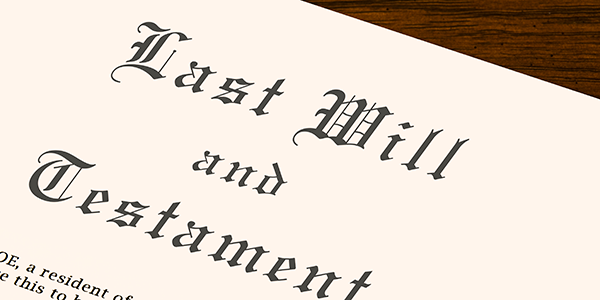Friday April 26, 2024
Personal Planner

Passing Unequal Shares in Your Will
Because children often look at their inheritance as a representation of their parents' love, most parents leave children equal shares of their estate. However, there are a number of good reasons why a parent might leave unequal shares. These reasons consider the needs of children, the potential large financial success of one child, a benefit previously given to a child that will be balanced in the estate, estrangement from a child or a blended family.
You will want to discuss carefully these circumstances with your attorney and other advisors. After thinking through your situation, you may decide that there are good reasons for making an unequal distribution of property to children.
Special Needs Child
Mary is a single mother with three children. Her oldest daughter, Jane is age 30 and is a nurse. She is married with two children.
Mary's son Joe is age 27, single and pursuing a career in sales. The third child, Kara, is age 17 and is disabled. She lives at home with Mary.
Mary has been financially careful and is building her estate. She owns her home, has an insurance policy that will be sufficient to pay off the mortgage on the home and provide an additional benefit for her children and has a good retirement plan.
Because Mary does not have a huge estate, she wants to be certain that Kara has sufficient resources. Both Jane and Joe are successful in their careers and do not need assistance for their present lifestyles. While Mary would like to provide some inheritance for them, her primary concern is to make certain that Kara receives needed care.
Therefore, Mary makes provision for a modest bequest of cash to Jane and Joe in her will. She also leaves a small bequest to a favorite charity. However, the majority of Mary's estate is transferred to a "special needs trust" for the benefit of Kara.
The benefit of the special needs trust is that the trustee may receive the property and use it at his or her discretion for Kara's benefit. If the special needs trust is correctly written, it will not reduce Kara's potential qualification for state or federal benefits.
The special needs trust also permits the trustee to pay for Kara's care as he or she determines appropriate. After Kara passes away, the special needs trust will be divided between the grandchildren of Mary and her favorite charity.
Favored Child
Sue and Tom have raised three children and are now empty nesters. Their oldest child Sam attended an excellent university, followed by medical school and is now a surgeon. Their younger children Julie and Linda both graduated from a state university.
Because Sue and Tom provided much greater financial support for Sam that enabled him to complete medical school and become a surgeon, they decided to transfer a larger proportion of their estate to Julie and Linda. While Julie and Linda both are successful and graduated from the state university, Sue and Tom believe that giving them a larger portion of the estate will create balance when compared with the benefits previously received by Sam.
Sue and Tom recognize that it's not possible to be perfectly equal in these circumstances, but hope the larger inheritance for Julie and Linda will make the total distribution as fair as possible.
Great Success Child
Tara and Jim have two children. Their oldest son Harvey has always had strong technical skills. After Harvey completed his engineering degree in college, he began working as a software programmer for a small company. In just a few years, he received shares of stock and the company went public. Harvey now has substantial wealth.
Harvey's sister, Lynn, also completed school and teaches third grade. She lives by herself in an apartment and has many friends at her school. However, Lynn has a very modest lifestyle and earnings in comparison to Harvey.
Tara and Jim thought carefully through the situation and talked to their attorney Harold. He explained that Harvey now has a large estate that could be subject to a significant future estate tax. If Tara and Jim were to transfer more property to Harvey, it simply makes his estate tax problem more difficult.
Because Lynn has comparatively modest resources, Tara and Jim decided that the vast majority of the estate would be transferred to her. However, they do have a family heirloom—a grandfather clock that has been handed down through four generations. While the grandfather clock does not have huge value, it is an important family memento. Tara and Jim decided to transfer the grandfather clock to Harvey and the balance of the estate to Lynn.
Estranged Child
Peter and Janet have raised two children. The oldest is a son named Bill and their daughter is Nancy. While Bill was in his early 20s, he dropped out of college and left without making contact with his parents or his sister Nancy. Bill was gone for 12 years and no one knew his location. After 12 years of wandering and traveling, Bill returned to his hometown community. However, he has not reached out to his parents or his sister. When they have attempted to contact him, Bill has avoided contact with his family.
While this is a difficult situation and brings sadness to Peter and Janet, they feel that Bill has quite deliberately separated himself from the rest of the family. Given Bill's decision to go his separate way, Peter and Janet believe that their inheritance can be used most productively by Nancy.
They are also concerned that if Bill receives an inheritance, he will not use it for good purposes. Therefore, Peter and Janet have decided to leave their estate to daughter Nancy.
Blended Family
Joe was a very successful bachelor entrepreneur and businessman. He invested very well and built a number of commercial buildings.
When Joe met Helen, she was divorced and had two children from her first marriage. Her children William and Lorraine were in their early 20s when Joe and Helen were married. They have had very minimal contact with Joe since the marriage.
Joe and Helen had a son named Steve. Helen's third child is quite diligent and has always been a good student. He completed college and recently passed his CPA exam.
When Joe and Helen were married, Joe was already in possession of a very large estate. His attorney recommended that they create a prenuptial agreement. Under this agreement, Helen would receive a substantial trust from Joe's estate with benefits for her lifetime. When she passes away, the trust assets will be distributed by the terms of the qualified terminable interest property trust created in Joe's estate plan.
Joe and Helen discussed their situation. Joe would like a larger portion of the estate to be transferred to their son Steve. Because the estate is quite large, there are more than sufficient resources to take care of Helen.
After discussion with their attorney Clara, Joe and Helen decided that if he were to pass away first, one-half of his estate would be transferred to Steve. The other half will be placed in a marital deduction trust to benefit Helen. She will have the income and, if needed for her care, the principal from that trust.
When Helen passes away, that marital trust will be divided with one-third to each of the three children.
While this plan provides a much larger inheritance for Steve, the other two children from Helen's first marriage will still also receive substantial assets.
Discussions with Children
These five plans all show specific reasons why a parent may choose to leave unequal amounts. While the reasons are apparent to the parent, they may not always be as easily understood by the children.
Many parents choose to explain and disclose an "unequal shares" plan during life. A meeting is frequently set up at the office of the family attorney. The entire family is invited. The parents explain the reasons why they have decided to create the estate plan with different amounts. Children have the ability to discuss the plan with the parents and ask questions of the financial advisors.
Later, many parents also will meet individually with children to explain the situation and circumstances. With the exception of the estranged child in the "Peter and Janet" example, most children will understand their parents' reasoning. The children may not always agree with their parents, but it usually is helpful for future family harmony for children to discuss their parents' decisions about inheritance.
Therefore, if you as a parent are thinking about passing an unequal amount to children, it may be wise to discuss a possible family meeting with your attorney, CPA or other financial advisor.




